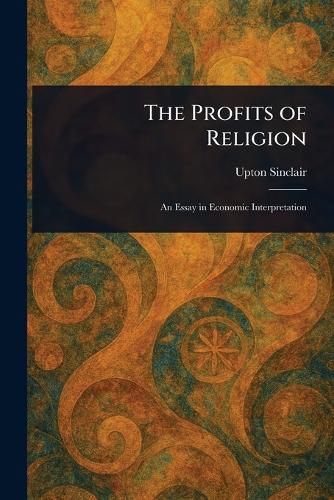Readings Newsletter
Become a Readings Member to make your shopping experience even easier.
Sign in or sign up for free!
You’re not far away from qualifying for FREE standard shipping within Australia
You’ve qualified for FREE standard shipping within Australia
The cart is loading…






This title is printed to order. This book may have been self-published. If so, we cannot guarantee the quality of the content. In the main most books will have gone through the editing process however some may not. We therefore suggest that you be aware of this before ordering this book. If in doubt check either the author or publisher’s details as we are unable to accept any returns unless they are faulty. Please contact us if you have any questions.
Upton Sinclair's controversial expose, "The Profits of Religion," delivers a scathing critique of religious institutions and their entanglement with worldly power. Sinclair, known for his impactful social commentary, turns his incisive gaze toward the perceived hypocrisy and financial motivations underlying organized Christianity.
This book delves into the complex relationship between religion, wealth, and social control, offering a provocative examination of the ethical implications of religious practices. A significant work of social criticism, "The Profits of Religion" remains a vital historical document for those interested in the intersection of religion and society. It explores themes of atheism and challenges conventional interpretations of religious doctrine. Presenting a controversial perspective on Christianity, this book provides a unique lens through which to examine the role of religion in the modern world.
This work has been selected by scholars as being culturally important, and is part of the knowledge base of civilization as we know it.
This work is in the public domain in the United States of America, and possibly other nations. Within the United States, you may freely copy and distribute this work, as no entity (individual or corporate) has a copyright on the body of the work.
Scholars believe, and we concur, that this work is important enough to be preserved, reproduced, and made generally available to the public. We appreciate your support of the preservation process, and thank you for being an important part of keeping this knowledge alive and relevant.
$9.00 standard shipping within Australia
FREE standard shipping within Australia for orders over $100.00
Express & International shipping calculated at checkout
This title is printed to order. This book may have been self-published. If so, we cannot guarantee the quality of the content. In the main most books will have gone through the editing process however some may not. We therefore suggest that you be aware of this before ordering this book. If in doubt check either the author or publisher’s details as we are unable to accept any returns unless they are faulty. Please contact us if you have any questions.
Upton Sinclair's controversial expose, "The Profits of Religion," delivers a scathing critique of religious institutions and their entanglement with worldly power. Sinclair, known for his impactful social commentary, turns his incisive gaze toward the perceived hypocrisy and financial motivations underlying organized Christianity.
This book delves into the complex relationship between religion, wealth, and social control, offering a provocative examination of the ethical implications of religious practices. A significant work of social criticism, "The Profits of Religion" remains a vital historical document for those interested in the intersection of religion and society. It explores themes of atheism and challenges conventional interpretations of religious doctrine. Presenting a controversial perspective on Christianity, this book provides a unique lens through which to examine the role of religion in the modern world.
This work has been selected by scholars as being culturally important, and is part of the knowledge base of civilization as we know it.
This work is in the public domain in the United States of America, and possibly other nations. Within the United States, you may freely copy and distribute this work, as no entity (individual or corporate) has a copyright on the body of the work.
Scholars believe, and we concur, that this work is important enough to be preserved, reproduced, and made generally available to the public. We appreciate your support of the preservation process, and thank you for being an important part of keeping this knowledge alive and relevant.